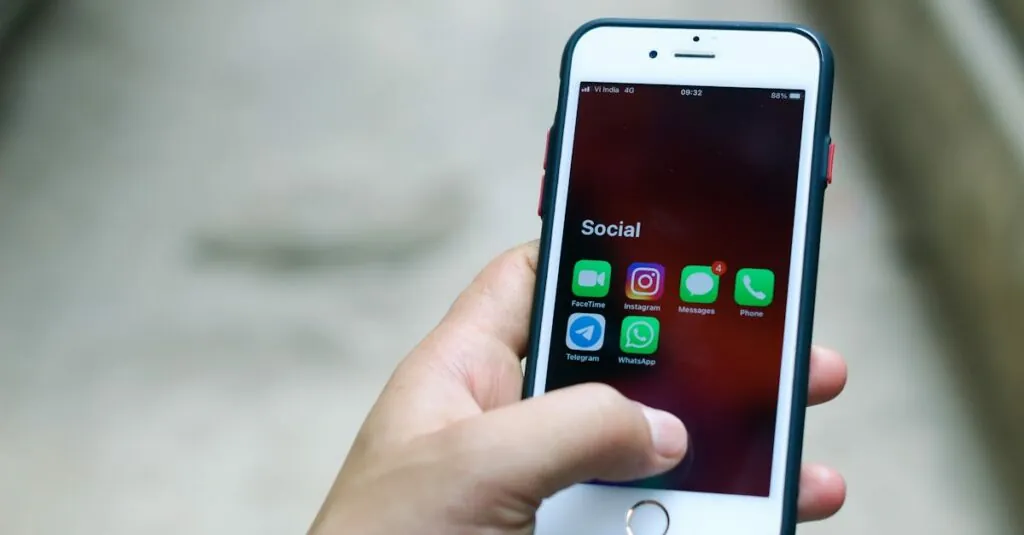In a world where secrets can slip through your fingers faster than a cat on a hot tin roof, protecting your privacy is no joke. If you’ve ever accidentally deleted a message and wished for a magic button to lock it away, you’re not alone. With iPhones being the treasure troves of our digital lives, knowing how to safeguard those recently deleted messages is crucial.
Table of Contents
ToggleUnderstanding Message Deletion on iPhone
Understanding how message deletion works on an iPhone is essential for users who want to safeguard their information. Recently deleted messages can still pose privacy risks if not managed properly.
Importance of Recently Deleted Messages
Recently deleted messages hold significance for various reasons. They serve as a backup in case users need to retrieve important conversations. Deleted messages often contain vital information, such as addresses or passwords. Users may also experience the frustration of partially deleting an essential message. Maintaining access to these messages can provide peace of mind, especially in moments of need.
How Messages Are Stored
Messages on an iPhone are stored in the Messages app’s database. Users’ texts exist in two categories: currently stored and recently deleted. When a message is deleted, it moves to the recently deleted folder, where it remains for 30 days. After this period, messages are permanently erased from the device. The Messages app allows for quick access to delete and recover messages, offering an organized way to manage communication. This structure helps maintain user organization and efficiency while navigating past conversations.
Methods to Lock Recently Deleted Messages
Protecting recently deleted messages on an iPhone requires specific strategies. Two effective methods include using Screen Time settings and exploring third-party apps.
Using Screen Time Settings
Accessing Screen Time settings on the iPhone offers a built-in solution to lock messages. First, navigate to Settings and select “Screen Time.” Enable the feature if it’s not already active. After that, set a passcode to secure the settings. Users can restrict access to the Messages app by choosing “Always Allowed” and making adjustments in the “App Limits” section. This action prevents unauthorized users from accessing messages, including those in the recently deleted folder. Notifications within the app also remain hidden from unauthorized access, enhancing overall privacy.
Utilizing Third-Party Apps
Third-party applications provide additional security options for message locking. Numerous apps like Signal and WhatsApp feature message encryption, ensuring conversations remain private. Some applications allow message access only through biometric authentication, such as fingerprint or face recognition. Users can download these apps from the App Store, install them, and transfer important messages from the Messages app to these secure platforms. Regularly backing up messages using these apps reinforces data protection measures and provides peace of mind regarding sensitive information.
Tips for Enhanced Privacy
Effective management of privacy settings can significantly enhance security for recently deleted messages on an iPhone. Protecting personal information requires vigilance and intentional adjustments.
Regularly Update Settings
Keep device settings current to maximize privacy and security. Regular updates offer protection against vulnerabilities that could expose recently deleted messages. Activating automatic updates ensures the iPhone receives timely security patches. Adjust notifications for the Messages app, limiting visibility to personal information. Enable Face ID or Touch ID for added authentication, allowing only authorized users access to sensitive messages.
Monitor App Permissions
Regularly review app permissions to maintain control over personal data. Limiting access to sensitive information minimizes exposure risks. Disabling unnecessary permissions for less secure apps can prevent unwanted access to your messages. Assess which apps require access to the Messages app, and revoke permissions for any that aren’t essential. These actions help protect recently deleted messages from being accessed by unauthorized applications.
Common Challenges and Solutions
Users often face challenges when trying to lock recently deleted messages on an iPhone. Addressing these common issues ensures better privacy and security.
Troubleshooting Lock Issues
Locking messages may not work due to misconfigured settings. To fix this, users should access Screen Time settings, making sure that the passcode is set correctly. Some users forget to enable restrictions for the Messages app, leading to unauthorized access. Adjusting these settings can effectively prevent breaches. It’s vital to test the passcode periodically to confirm that it functions correctly. Restarting the device can sometimes resolve glitches that prevent the feature from activating.
Addressing App Limitations
Inconsistent behavior from third-party apps may frustrate users reliant on them to secure messages. Some messaging applications lack comprehensive security features, causing concerns about data protection. Choosing apps with robust encryption, like Signal or WhatsApp, can minimize these risks. Users must also check for app updates frequently, as developers often release security patches. Not all apps support locking recently deleted messages, so selecting the right app is key for effective privacy management.
Taking steps to lock recently deleted messages on an iPhone is crucial for maintaining privacy in an increasingly digital world. By utilizing features like Screen Time and exploring secure messaging apps, users can effectively safeguard their sensitive information. Regularly updating privacy settings and monitoring app permissions further enhances security.
With the right strategies in place, users can protect their valuable conversations from unauthorized access. It’s essential to stay proactive in managing privacy settings and ensuring that personal data remains secure. By following these guidelines, users can navigate their digital lives with greater confidence and peace of mind.








